
September 24, 2014

The Parthenon
Source: Shutterstock
The big secret covered up by ancient philosophers was that they didn”t find the Greek and Roman deities terribly plausible, which isn”t really stop-the-presses news. As Edward Gibbon joked in The History of the Decline and Fall of the Roman Empire, in the most famous example of his periodic prose style:
The various modes of worship, which prevailed in the Roman world, were all considered by the people as equally true; by the philosopher as equally false; and by the magistrate as equally useful.
One finding from Melzer’s chronological list of quotations is that there is little of even Gibbon’s kind of Tory political cynicism on display until Boccaccio in the 14th century points out the ancient alliance between kings and the poets who propagandized for them. (Similarly, nobody in Melzer’s list accuses the writers of the past of sexual hypocrisy until Montaigne in the 16th century.) Instead, virtually all the great minds were what would today be considered extreme conservatives and probably fascists.
While we proclaim our faith in democracy, the condemnation of Socrates by the Athenian democracy was almost universally seen by subsequent philosophers as proving democracy’s malignancy. There’s virtually no evidence in Melzer’s quotes of antiauthoritarianism or egalitarianism in the great philosophers. Hierarchy was seen as a self-evident virtue. The people’s right to know is a relatively recent notion, probably traceable to Martin Luther’s insistence that every man should read the Bible for himself.
Today, the extremism of our culture’s demands for attestations of faith in equality and transparency is a mask for the movement back toward censorship and esotericism. We live in a society in which the fundamental truths”such as, that talents are distributed unequally by genetics”are increasingly considered unfit for public discussion, and careers as eminent as that of as James D. Watson, codiscoverer of the structure of DNA, are destroyed for letting slip a lack of fidelity to the reigning taboos.
G.K. Chesterton observed:
The Declaration of Independence dogmatically bases all rights on the fact that God created all men equal; and it is right; for if they were not created equal, they were certainly evolved unequal. There is no basis for democracy except in a dogma about the divine origin of man.
A culture that doesn”t believe in God but does insist that He created all persons equally is increasingly going to have to discourage snickering with the lash.